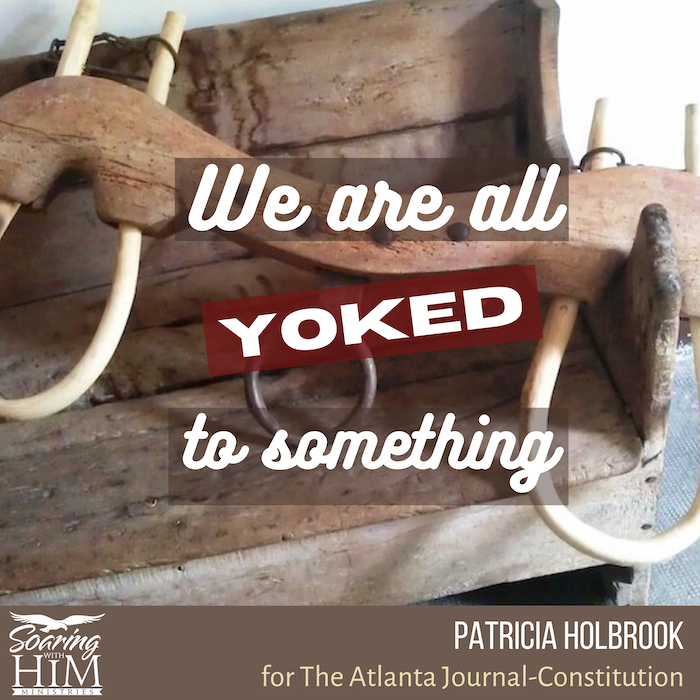 “Cast your burden upon the Lord, and he will sustain you.” —King David, Psalm 55
“Cast your burden upon the Lord, and he will sustain you.” —King David, Psalm 55
While studying the book of Jeremiah in the Old Testament, I came across a familiar allegory that is used repeatedly throughout Scriptures: the yoke. In his book, the “weeping prophet” frequently confronted God’s people concerning their sin and rebellion against His commandments and statutes. Jeremiah’s admonishment culminates in his prophecy concerning Jerusalem’s fall, which resulted in the Babylonian conquest in 586 B.C.
In chapter five, Jeremiah refers to the spiritual leaders’ disobedience as “breaking off the yoke and tearing off the bonds.” As I started digging deeper to understand the “yoke” metaphor better, I flipped to the Gospel of Matthew in the New Testament, where Jesus said these infamous words:
“Come to me, all who are weary and burdened, and I will give you rest. Take my yoke upon you and learn from me, for I am gentle and humble of heart, and you will find rest for your soul.”
Come to me, all who are weary and burdened, and I will give you rest. #MondayDevotional #MondayMotivation @AJC Click To TweetThe illustration made me curious. I know what a yoke is. A yoke is a tool used to keep an ox captive, not to set it free. And yet, the prophet refers to “breaking the yoke” as a negative thing. And Jesus tells His followers to “take his yoke upon (them) to find rest for (their) souls.” According to Scriptures, the conclusion is clear: One cannot find peace unless they are “yoked” to God. I needed to dig a little deeper.
My study led me to an interesting French article published in 1977 called: “Better Farming Series 14 – Farming with Animal Power.” The exposé is a step-by-step guide for farmers who wish to train an ox to work while wearing a yoke.
A yoke is a piece of wood placed on two oxen’s heads or necks while they pull farm implements. It must be made of sturdy wood, but it cannot be too heavy; otherwise, it will tire the animals. As I continued reading the article, one of the steps jumped out of the page:
“To get young oxen used to the yoke, you can put the ox which is to be trained along with an ox already trained. (…)”
My mind went back and forth to my recent readings of Scriptures, in particular, Jesus’ words in the Gospels.
When Jesus said those words, He was referring to the extra burdens the Pharisees and teachers of the law implemented in their daily devotions and demanded from their followers. Jesus was saying that His followers did not need the weight of empty religion. In the context of His teachings, He offered a yoke that guided them, instead of binding them to the “try harder” or “do more” burden of religion and legalism.
Jesus' 'yoke' guides us, instead of binding us to the 'try harder' or 'do more' burden of religion and legalism. #MondayDevotional #MondayMotivation @AJC Click To TweetThe Jews that listened to Jesus understood the reference. They could not help but remember the hundreds of rules they had to follow, only to find themselves ever further from “pleasing God.” The yoke that bound them to the strong ox of legalism was heavy and unsustainable. They found themselves working harder to please God’s requirements, whereas never finding peace.
The same happens today. Many religious people find themselves trapped under a heavy yoke, bound to empty religious activities that can never bring real joy and purpose. Even the very effort to stay faithful to God can weigh us down if we are not careful. On the other hand, God’s yoke is the free offer of help by a much stronger, more “trained” Force. It’s the light yoke that guides rather than binds and makes us genuinely productive rather than tired from empty laboring.
God’s yoke is the free offer of help by a much stronger, more 'trained' force. It’s the light yoke that guides rather than binds and makes us genuinely productive rather than tired from empty laboring. #MondayDevotional… Click To TweetAs I meditated upon the importance of being yoked to a God and the apparent paradox that the imagery brings, a big smile crossed my face. The illustration could not be timelier.
As we experience the uncertainties our society faces, from political and social unrest to health and economic concerns, you and I are certainly yoked to something. The question is: Will we choose to be bound to the weighty anxieties of tomorrow and empty laboring, or will we choose to lay down our burdens and remain yoked to the only One who truly knows where we are going? Our response will determine whether we can indeed find rest, even in the darkest days.
Will we choose to be bound to the weighty anxieties of tomorrow and empty laboring, or will we choose to lay down our burdens and remain yoked to the only One who truly knows where we are going? Click To TweetThis article was originally published in Patricia’s column for The Atlanta Journal-Constitution on Saturday – July 18, 2020. Find it on the AJC website HERE.
LINKUP PARTY opens Wednesdays at 6 am!
Christian Bloggers, come share your Blog with our audience below:
1. Add your Link.
2. Visit the blogger before or after and encourage them with a comment.
3. Share on social media. Click below to share on Twitter that you are joining us! We would love to have you follow the ministry on Twitter and Facebook as well: Soaring with Him FB Page
LINKUP is open! This week, my latest @AJC column is a reflection on the biblical meaning of the 'yoke' and a challenge to every Christian: what (or who) are you bound to? Join us and share your blog with our audience! Click To Tweet

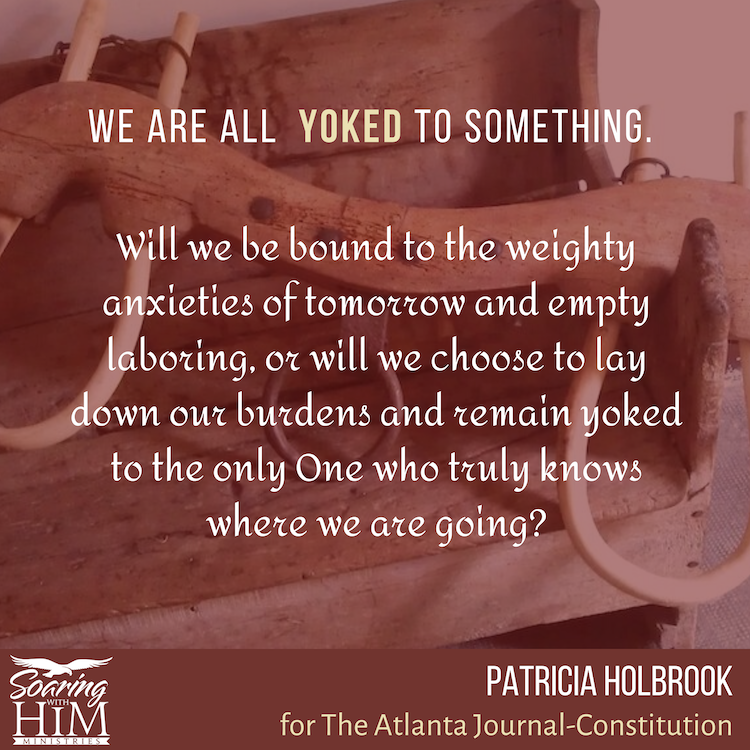
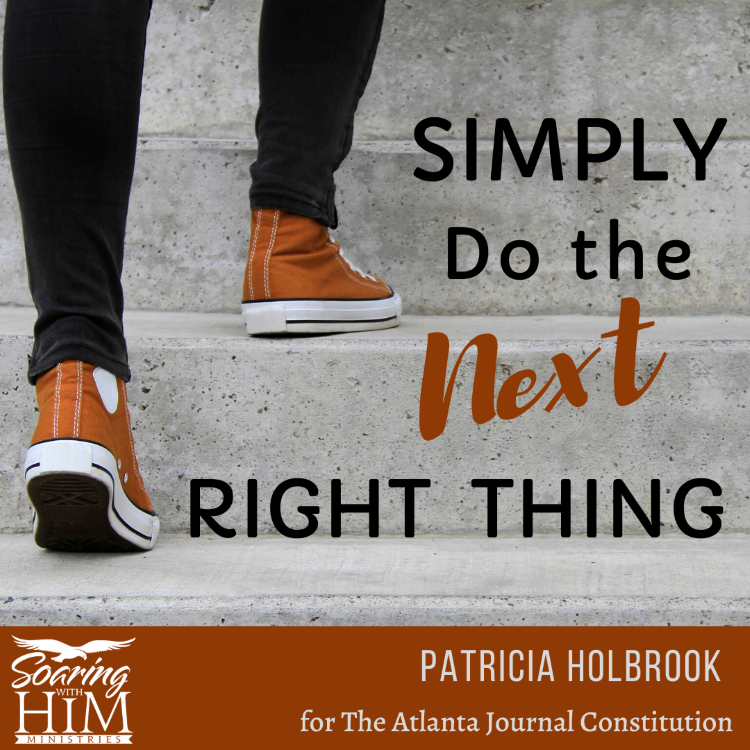
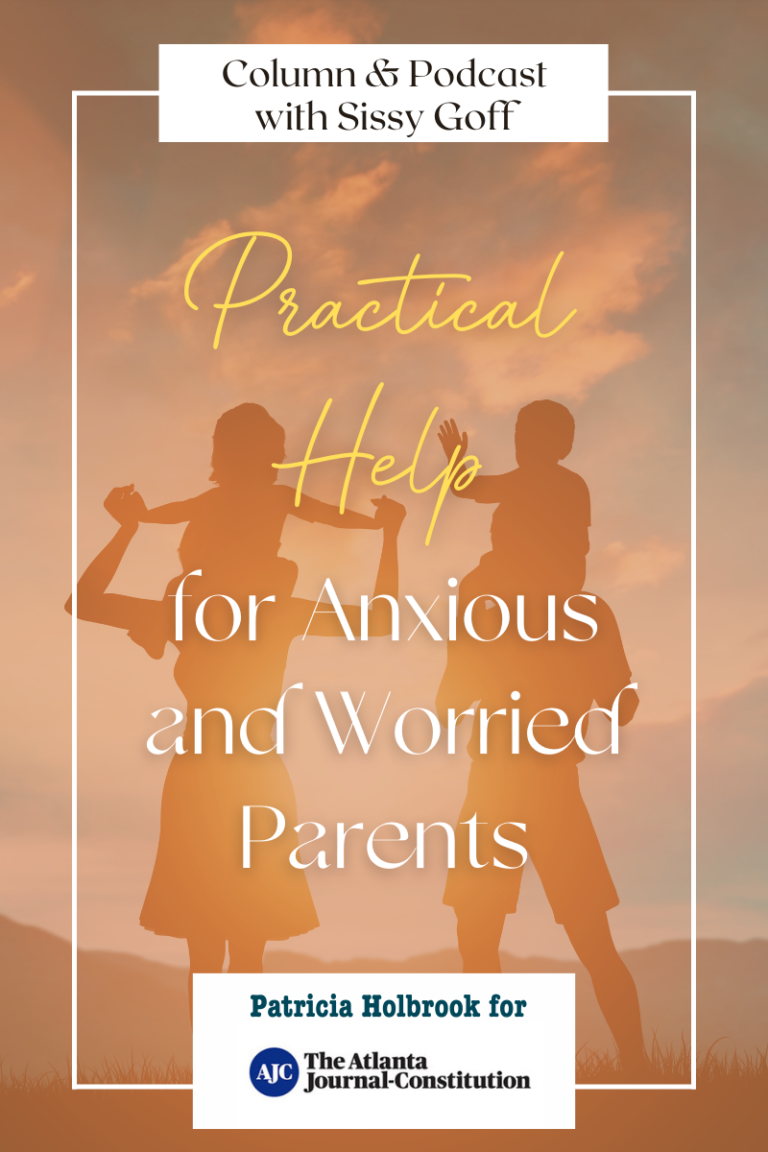
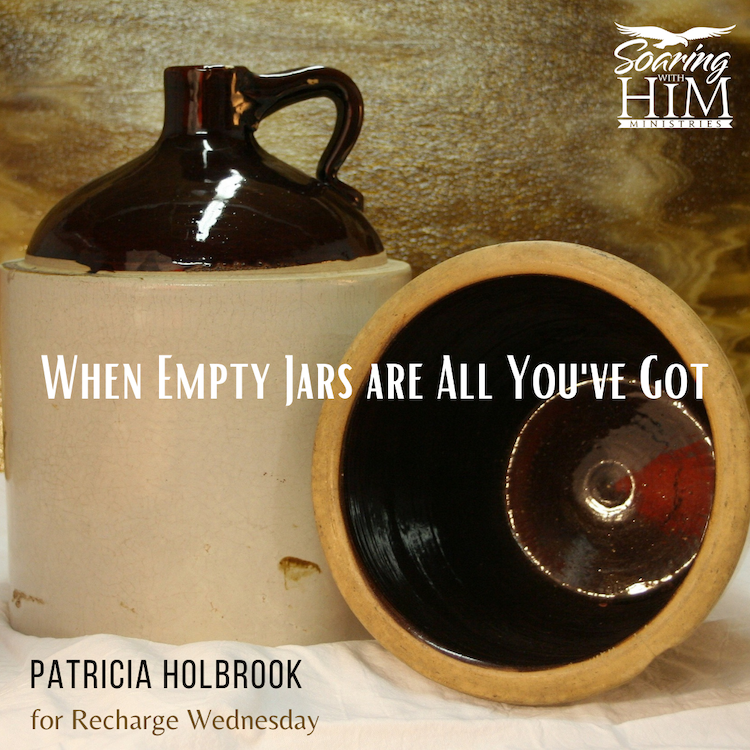
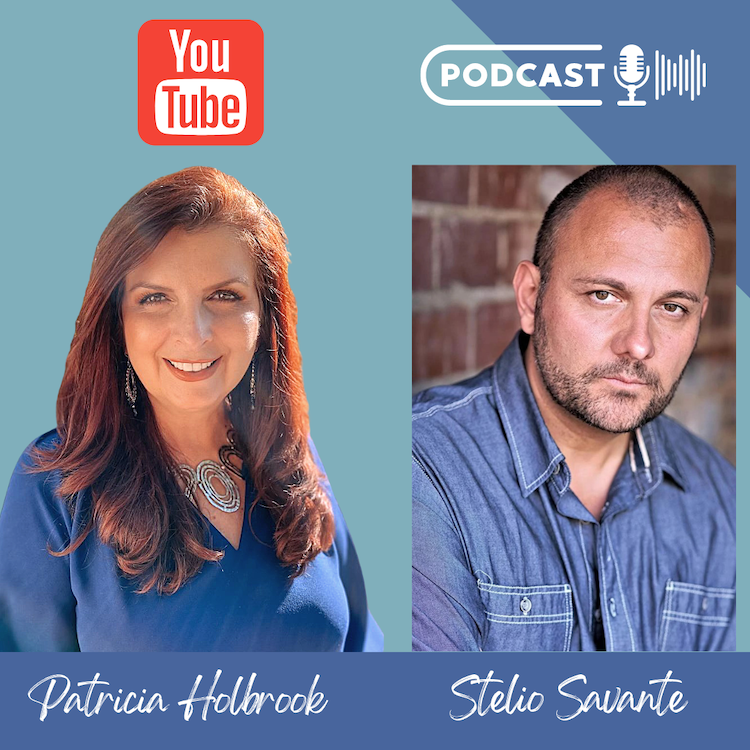
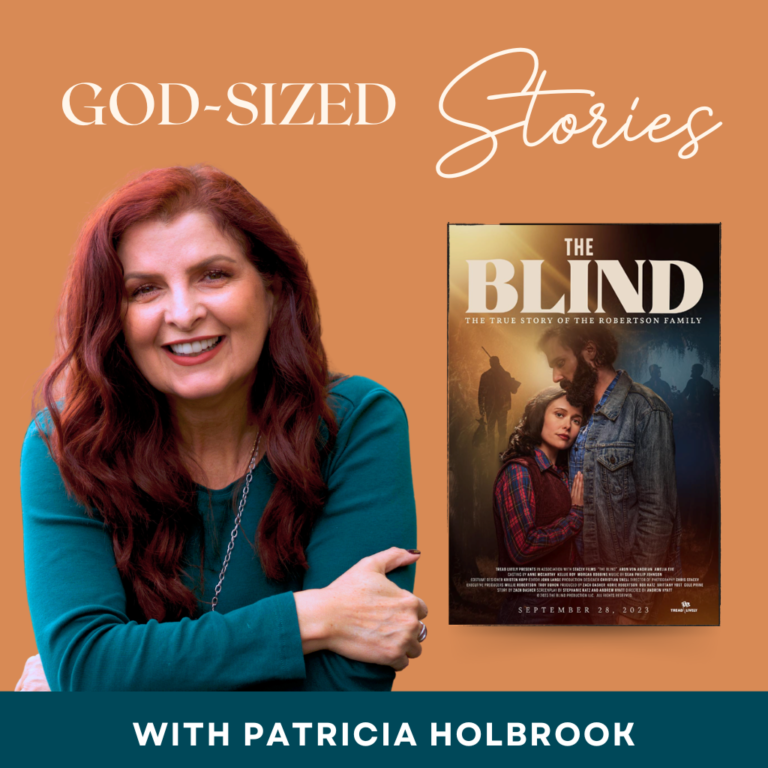
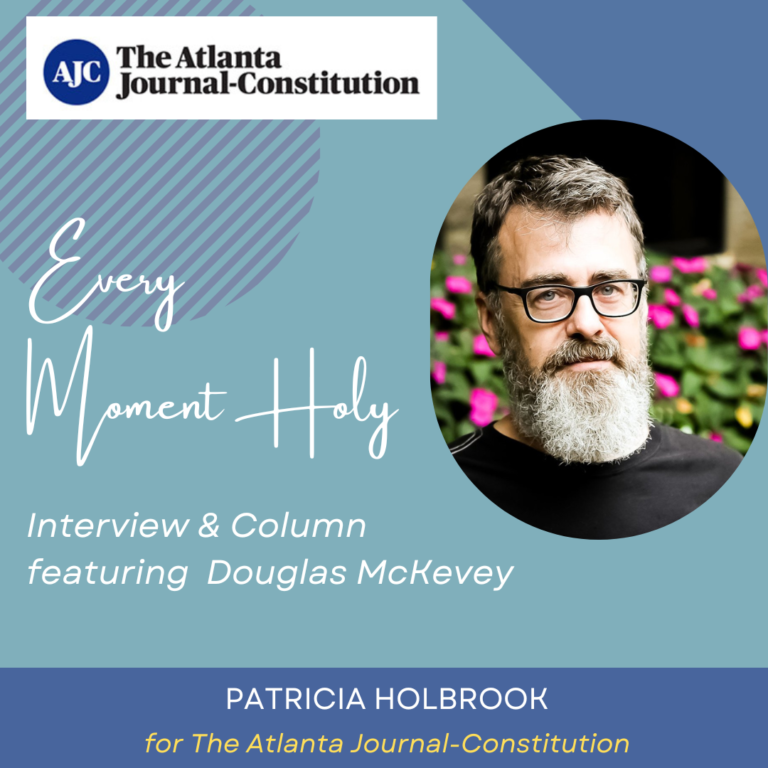
Wonderful reflection, Patricia! May we choose to be yoked to God in all that we do.
Blessings!
This is a good word!
So true–we’re all yoked to something, and any yoke but His is too weighty to bear.
Apparently, first century teachers referred to their instruction and their manner of life as their “yoke,” and Jesus claimed his was easy and light. I see the gift of this every single day as I fight all the heaviness other systems of righteousness might impose on me –including all my self – salvation strategies.
Powerful, Patricia. I never want to be yoked to the legalism of religion or the philosphies of the world. Love this: Jesus “offered a yoke that guided them, instead of binding them to the “try harder” or “do more” burden of religion and legalism.”
Patricia, I love the image of being connected to Jesus. His yoke is easy and His burden is light!
Thanks for giving this word study new meaning.
Hello, Thanks for this link patry
This was so thought-provoking, thank you!